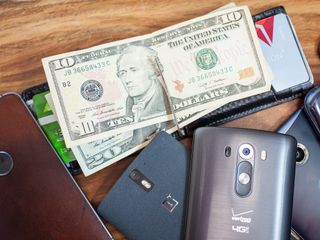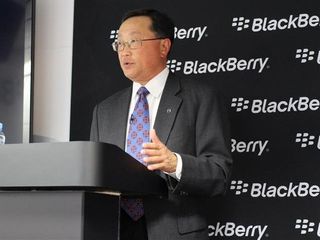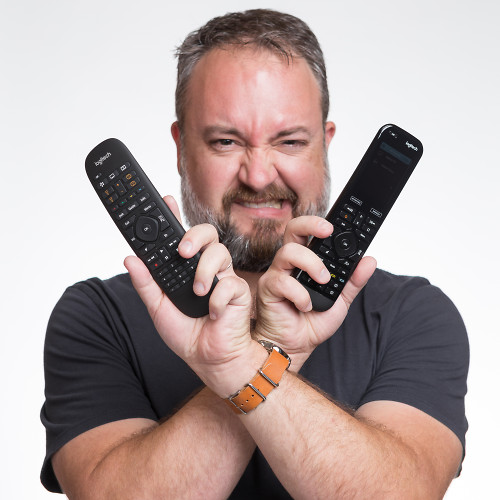How you can make the BlackBerry CEO's batshit-crazy smartphone dream a reality

John Chen cries 'discrimination' as discriminating consumers continue to choose Android and iOS
"All wireless broadband customers must have the ability to access any lawful applications and content they choose," BlackBerry CEO John Chen writes in a recent manifesto on net neutrality that spans from carriers to internet service providers to applications themselves.
And you know what? He's right. You should be able to access any lawful application and content you choose.
And you can. Here's how.
- Step 1: Open your wallet. Retrieve credit card.
- Step 2: Buy an iPhone or iPad. Or an Android phone or tablet. Or a Windows phone. Or even a BlackBerry. Or whatever the hell you want.
See? You do have a choice.
Chen's misguided stance on apps, content and 'neutrality'

Where Chen goes off the rails — and to be fair there's a good bit in his piece that deserves your time, particularly the parts about carriers and ISPs — is when it comes down to compelling application developers to provide for any and all platforms.
There's 'open' and 'neutral' when it comes to the Internet. And then there's what John Chen thinks that should mean for apps.
"Key to BlackBerry's turnaround has been a strategy of application and content neutrality," Chen writes. "For example, we opened up our proprietary BlackBerry Messenger (BBM) service in 2013, making it available for download on our competitors' devices." This is true. Bringing BBM to Android — where it's been installed between 50 million and 100 million times, never mind the whole app review astroturfing thing — and iOS was a big deal. But "making [BBM] available ... on our competitors' devices" isn't the same as opening up a proprietary system as Chen implies. It's merely more widely available. As we've talked about so many times before, "open" tends to mean whatever the beholder wants it to mean. But don't let that stop anyone from using the buzzwords.
It gets worse, however. We'll just let these paragraphs speak for themselves:
Be an expert in 5 minutes
Get the latest news from Android Central, your trusted companion in the world of Android
Unfortunately, not all content and applications providers have embraced openness and neutrality. Unlike BlackBerry, which allows iPhone users to download and use our BBM service, Apple does not allow BlackBerry or Android users to download Apple's iMessage messaging service. Netflix, which has forcefully advocated for carrier neutrality, has discriminated against BlackBerry customers by refusing to make its streaming movie service available to them. Many other applications providers similarly offer service only to iPhone and Android users. This dynamic has created a two-tiered wireless broadband ecosystem, in which iPhone and Android users are able to access far more content and applications than customers using devices running other operating systems. These are precisely the sort of discriminatory practices that neutrality advocates have criticized at the carrier level.Therefore, neutrality must be mandated at the application and content layer if we truly want a free, open and non-discriminatory internet. All wireless broadband customers must have the ability to access any lawful applications and content they choose, and applications/content providers must be prohibited from discriminating based on the customer's mobile operating system.
BlackBerry is the losing team. But you simply cannot force anyone to keep playing for it.
Again, Chen is correct. A two-tiered system has emerged, for better or worse. Android and iOS are winning. That's business. It happens. Not everybody gets a trophy. But neither Android nor iOS is a "wireless broadband ecosystem" in the same sense that broadband Internet itself is akin to water coming down a pipe and should be regulated as such. Chen is mixing metaphors and dropping buzzwords in a regrettable attempt to shame developers into making applications for BlackBerry. That's all. And while we agree that more applications on more platforms is better, no one in their right mind should believe that forcing a developer to write a BlackBerry app if they also want to write an Android or iOS app is in any way something the CEO of a company of BlackBerry's stature — let alone anyone with a basic understanding of free enterprise — should be suggesting.
Chen mentions "discrimination" a lot as if it's only a bad thing. But after reading his manifesto, you have to wonder if he understands what it means. We all discriminate every day. The reason for picking one thing over another is what's important. If consumers and app developers are choosing Android and iOS over BlackBerry and Windows Phone, perhaps there's a reason for that. The new BlackBerry hardware is an anachronism. BlackBerry no longer can compete — and hasn't for a long time — on the operating system front. (Services, however, is still another matter.)
Both Chen and BlackBerry at large know exactly what discriminating consumers want. It's just not what BlackBerry is selling.

